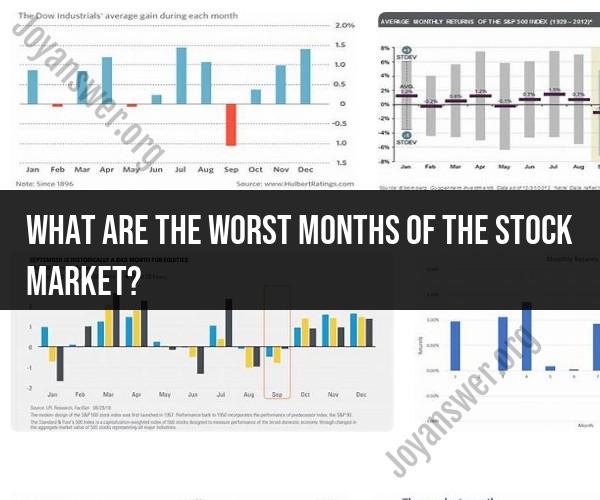What are the worst months of the stock market?
Historically, there are certain months that have exhibited lower average returns or higher volatility in the stock market compared to others. However, it's important to note that the stock market is influenced by a wide range of factors, and past performance is not indicative of future results. Here are some insights into months that have often been associated with poorer stock market performance:
September: Historically, September has been considered one of the weakest months for stock market returns. Some investors attribute this to factors like investors returning from summer vacations, potential profit-taking, or concerns about the market's performance in the final quarter of the year.
October: While October is known for major historical stock market crashes, such as the 1929 Great Depression crash and the 1987 Black Monday crash, it is important to remember that these events are relatively rare. October has not consistently been the worst month for stocks, but it does have a reputation for volatility.
August: August can be a relatively slow month for trading, as many investors take vacations during the summer. Reduced trading activity can sometimes lead to increased volatility, though this is not always the case.
May: The phrase "Sell in May and go away" suggests that the period from May to October tends to have lower stock market returns compared to the rest of the year. However, this is a generalization, and market performance can vary widely from year to year.
February: Historically, February has had lower average returns compared to some other months. This may be influenced by factors like year-end tax planning and corporate earnings reports.
It's important to emphasize that while these months may have exhibited certain trends in the past, the stock market is influenced by a multitude of factors, including economic data, corporate earnings reports, geopolitical events, and central bank policies. Therefore, it is not advisable to base investment decisions solely on historical performance in specific months.
Investors should have a diversified portfolio and a long-term investment strategy that aligns with their financial goals and risk tolerance. Additionally, seeking advice from financial professionals or conducting thorough research before making investment decisions is crucial. Market timing based on specific months is generally not a recommended investment strategy, as it can be difficult to predict short-term market movements accurately.
Stock Market Volatility: Analyzing the Worst Months for Investors
Stock market volatility is a measure of how much the stock market moves up and down. It is typically measured by the standard deviation of daily returns. A higher standard deviation indicates greater volatility.
There are a number of factors that can contribute to stock market volatility, including economic news, geopolitical events, and natural disasters.
September is historically the worst month for investors, with an average return of -1.1% since 1928. This is due to a number of factors, including the end of the summer vacation season, the start of the new tax year, and the potential for hurricanes and other natural disasters.
Other months that have historically been difficult for investors include February, May, and August.
Market Turbulence: Exploring the Historically Difficult Months for Stocks
There are a number of reasons why September is historically the worst month for investors. One reason is that the summer vacation season typically comes to an end in September, and investors return to the market and start selling stocks to raise cash for expenses such as tuition and back-to-school supplies.
Another reason for September's poor performance is the start of the new tax year. Investors may sell stocks in September to reduce their capital gains tax liability.
Finally, September is also a time of year when hurricanes and other natural disasters are more likely to occur. These events can cause significant damage to property and infrastructure, which can lead to economic uncertainty and market volatility.
Other months that have historically been difficult for investors include February, May, and August. February is often called the "February Effect" because of its tendency to be a down month for the stock market. May is another month that has historically been difficult for investors, perhaps due to the end of the first quarter and the start of the summer vacation season. August is often a slow month for the stock market, as many investors are on vacation and trading volume is low.
Preparing for Financial Downturns: Navigating the Challenging Periods in Stock Markets
There are a number of things that investors can do to prepare for financial downturns and navigate the challenging periods in stock markets. Here are a few tips:
- Have a long-term investment horizon. If you have a long-term investment horizon, you can weather the ups and downs of the stock market and still achieve your financial goals.
- Diversify your portfolio. Don't put all your eggs in one basket. Diversify your portfolio by investing in a variety of asset classes, such as stocks, bonds, and real estate.
- Rebalance your portfolio regularly. As your portfolio grows and changes, it is important to rebalance it regularly to ensure that it still meets your risk tolerance and investment goals.
- Have a cash reserve. It is a good idea to have a cash reserve to cover unexpected expenses or to take advantage of investment opportunities that may arise during a market downturn.
- Don't panic sell. One of the worst things you can do during a market downturn is to panic sell. When the market is down, it is important to stay calm and stick to your investment plan.
By following these tips, investors can prepare for financial downturns and navigate the challenging periods in stock markets.












